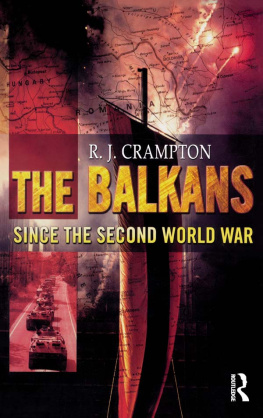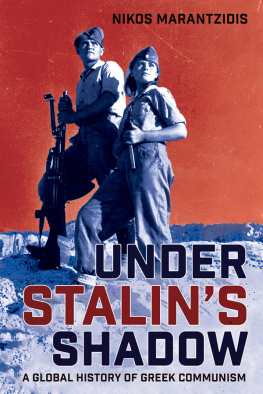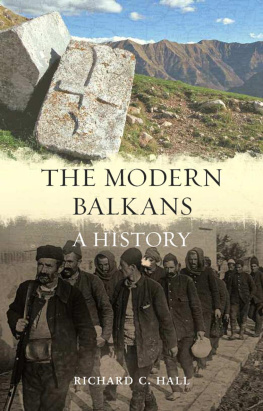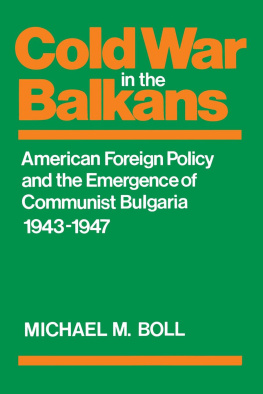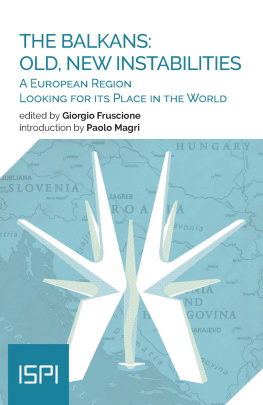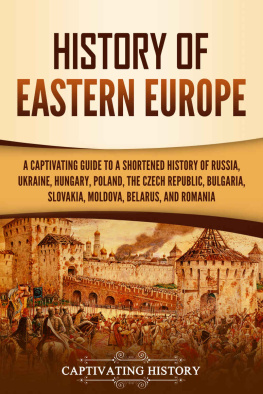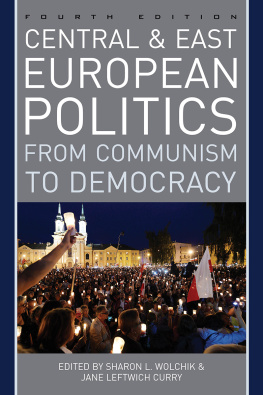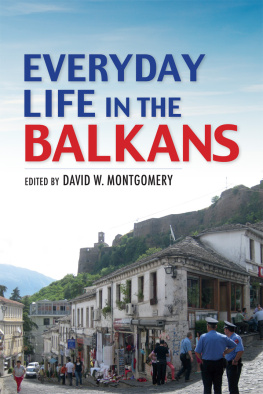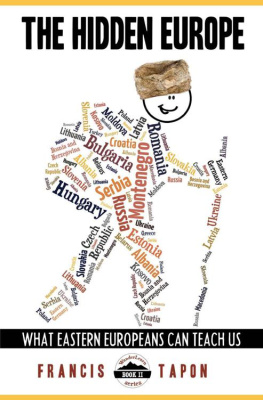THE BALKANS SINCE THE SECOND WORLD WAR
_______________
The Postwar World
General Editors: A. J. Nicholls and Martin S. Alexander
As distance puts events into perspective, and as evidence accumulates, it begins to be possible to form an objective historical view of our recent past. The Postwar World is an ambitious series providing a scholarly but readable account of the way our world has been shaped in the crowded years since the Second World War. Some volumes will deal with regions, or even single nations, others with important themes; all will be written by expert historians drawing on the latest scholarship as well as their own research and judgements. The series should be particularly welcome to students, but it is designed also for the general reader with an interest in contemporary history.
Decolonization in Africa, Second Edition
J. D. Hargreaves
The Community of Europe: A History of European Integration since 1945, Second Edition
Derek W. Urwin
Northern Ireland since 1945, Second Edition
Sabine Wichert
A History of Social Democracy in Postwar Europe
Stephen Padgett and William E. Paterson
The Special Relationship: A Political History of Anglo-American Relations since 1945
C.J. Bartlett
Rebuilding Europe: Western Europe, America and Postwar Reconstruction
D. W. Ellwood
Central Europe since 1945
Paul G. Lewis
International Relations since 1945. A History in Two Volumes
John Dunbahin
The Cold War: The Great Powers and their Allies
The Post-Imperial Age: The Great Powers and the Wider World
Modern Indonesia: A History since 1945
Robert Cribb and Colin Brown
Peace Movements: International Protest and World Politics since 1945
April Carter
The Bonn Republic: West German Democracy, 19451990
A. J. Nicholls
Greece since 1945
David Close
First published in Great Britain in 2002 by Pearson Education Limited
Published 2013 by Routledge
2 Park Square, Milton Park, Abingdon, Oxon OX14 4RN
711 Third Avenue, New York, NY, 10017, USA
Routledge is an imprint of the Taylor & Francis Group, an informa business
Copyright Taylor & Francis 2002
The right of R. J. Crampton to be identified as author of this work has been asserted by him in accordance with the Copyright, Designs and Patents Act 1988.
All rights reserved. No part of this book may be reprinted or reproduced or utilised in any form or by any electronic, mechanical, or other means, now known or hereafter invented, including photocopying and recording, or in any information storage or retrieval system, without permission in writing from the publishers.
Notices
Knowledge and best practice in this field are constantly changing. As new research and experience broaden our understanding, changes in research methods, professional practices, or medical treatment may become necessary.
Practitioners and researchers must always rely on their own experience and knowledge in evaluating and using any information, methods, compounds, or experiments described herein. In using such information or methods they should be mindful of their own safety and the safety of others, including parties for whom they have a professional responsibility.
To the fullest extent of the law, neither the Publisher nor the authors, contributors, or editors, assume any liability for any injury and/or damage to persons or property as a matter of products liability, negligence or otherwise, or from any use or operation of any methods, products, instructions, or ideas contained in the material herein.
British Library Cataloguing in Publication Data
A CIP catalogue record for this book can be obtained from the British Library
Library of Congress Cataloging in Publication Data
A CIP catalog record for this book can be obtained from the Library of Congress
ISBN-13: 978-0-582-24883-0 (pbk)
Typeset in 10.5/12pt Bembo by Graphicraft Limited, Hong Kong
_______________
T heir very diversity makes the Balkans impossible to define confidently or precisely. Topographically the region varies from the mountain fastnesses of northern Albania and the higher peaks of the Carpathians, through the fertile valley of the lower Danube, to the Mediterranean coastline of Greece and its islands.
The Oxford English Dictionary, second edition 1989, has the following entry for the adjective Balkan: Of or pertaining to the peninsula bounded by the Adriatic, Aegean and Black Seas, or to the countries or peoples of this region: spec. with allusion to the relations (often characterized by threatened hostilities) of the Balkan states to each other or to the rest of Europe The Encyclopaedia Britannica confines itself to a more political definition: In contemporary usage the term Balkans signifies the territory of the states of Albania, Bosnia and Hercegovina, Bulgaria, Croatia, Greece, Macedonia, Moldova, Romania, Slovenia, and Yugoslavia (Montenegro and Serbia), but even this authoritative source cannot have complete confidence in its definition, adding, though there is considerable doubt as to whether Slovenia and Romanian Transylvania are Balkan in any meaningful sense. The encyclopaedia then notes that The term also includes the European portion of Turkey, although Turkey is not a Balkan state.
The Encyclopaedia Britannica uses political criteria in defining the area but, when first coined in 1808 by the German August Zeune, the phrase Balkan peninsula was used as a purely geographic term and had even less political weight at that time than the word German. Balkan was a Turkish word meaning wooded upland, and was applied to what the ancients had called the Haemus mountains, that is the range which runs east-west through the centre of present-day Bulgaria. This geographic usage persisted throughout most of the nineteenth century; when a political phrase was needed it was usually Turkey in Europe, the Ottoman empire, for much of the century, being the largest political unit in the area.
That the dismemberment of Turkey in Europe took place in conflicts which became known as the Balkan wars (191213) indicated that the term had been given a political as well as a geographic loading. The association of the Balkans with the phenomena of political fragmentation and hostility was well-established by the end of the First World War, Harold Nicolson noting in his classic memoir of the Paris peace negotiations that We succeeded in Balkanizing Europe although we europeanized the Balkans. The pejorative connotations have remained and intensified. In recent months there has been a tendency among the more slip-shod of British journalists to use the term Balkan to mean those areas of the peninsula which have fallen, or which seem in danger of falling, prey to anarchy and violence; in this definition, Albania, Kosovo and Macedonia are in and Bulgaria and Greece are out.
It is generally acknowledged that like all great European peninsulas, the Balkans are a world apart; But this does not take fully into account the mercantile communities which were established in Ragusa (Dubrovnik) and at other points on the coast. Even where it did exist the first Europe began to decay from the mid-nineteenth century as production-orientated systems began to make their impact, as, soon after, did western ideas of nationalism and the nation-state. The problem was that the economic and the political odds were stacked against the Balkans. Most of the area did not have easy communication with either the great centres of consumption in central and western Europe or the oceans linking it with the wider world, and the construction of nation states was hideously difficult in areas which were not only ethnically diverse but in which ethnic divisions often coincided with social ones, meaning that the urban commercial or manufacturing bourgeoisie was frequently of a different ethnic group to the surrounding countryside. The situation was made worse by the fact that individual European great powers had their own fish to fry and invariably did all they could to ensure that it was their fish which was best cooked.

